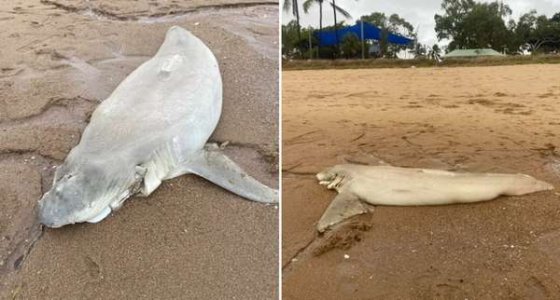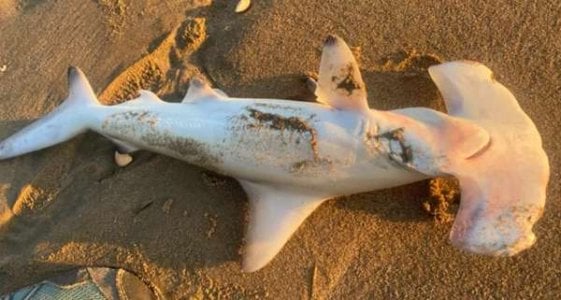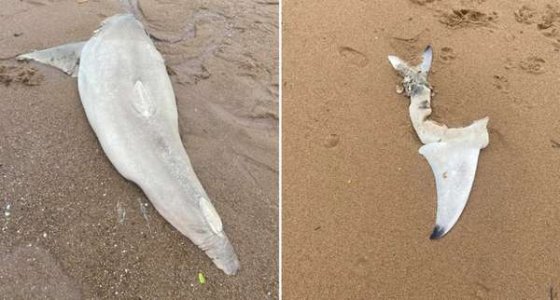Outrage ignites over the shocking discovery of a mutilated shark on Queensland beach
Australia’s beaches are a treasure trove of diversity and beauty, enchanting both locals and international travellers alike with their sweeping golden sands, rolling waves, and untamed marine life.
Throughout this article, there may be distressing images of animal cruelty. Reader discretion is advised.
Queensland's coastline enjoys an iconic reputation worldwide and serves as a sanctuary for a vast array of marine creatures.
Among these creatures is the Lemon Shark, a species of shark found in tropical and subtropical waters. It is named after its pale yellow-brown colouration.
Sadly, it's not always sunshine and rainbows on our stunning beaches. On some days, the sands bear witness to tales of human-induced horrors inflicted upon the innocent beings of the sea.

Residents of Townsville grappled with a distressing sight when they discovered a mutilated shark washed up ashore on Rowes Bay beach.
The creature’s fins, tail, and lower jaw were crudely severed, a sight so chilling that it seemed to be snatched right out of a horror film.
A shocked beachgoer shared images of the wounded sea creature on Facebook, sparking widespread dismay and creating a rallying point for locals aghast at the terrifying instance of animal cruelty.
Her post ignited a ripple of anger, frustration and an urgent plea for accountability.
One user responded, ‘I was there with my kids yesterday and it was there. They were not happy to see this at all, very sad indeed.’
Another shared that they saw the fins and tail on the sand, but the 'big shark wasn't there’, pointing to a disturbing trend.
Indeed, sightings of such horrifying acts seem to be on the rise.
Only a week prior, the lifeless body of a baby hammerhead shark had washed ashore nearby, painting a dire picture of the ruthless harm being inflicted on marine life.

Upon examination of the shared images, Dr Leonardo Guida, a shark scientist from the Australian Marine Conservation Society (AMCS), concluded that the unfortunate victim was a Lemon Shark—an unthreatened species that had unfortunately met a gruesome end.
'First and foremost, it’s definitely a case of shark finning — you can tell by the removal of the dorsal fins. In Queensland on the east coast, there's a “fins on” rule, meaning any commercially harvested species of fish has to be brought back to land with its fins naturally intact. This is clearly an illegal act.' Dr Guida shared.
Drawing from his vast experience, Dr Guida minced no words when he condemned the barbaric act, stating, 'Either way, it shouldn’t have been treated like that — it should have been released, it’s clearly a barbaric act.'
An unfortunate fact that many of us may not realise is that sharks, including the humble Lemon Shark, play an essential role in maintaining the balance of our marine ecosystems.
Sharks help keep the ocean's population in check, and their decline can lead to the overgrowth of other predator species that can wreak havoc on the delicate ecological balance.
Every cruel act against these creatures, like this instance, is a blow to the health of the oceans we hold dear.

Responding to the ongoing outcry, a representative from Fisheries Queensland stated that while fish waste disposal might not be technically illegal, it’s a matter of ethics and respect for an environment shared by others.
In Queensland's east coast, penalties for possession of detached shark fins are in place to deter such illegal and unethical activity. Recreational fishers face fines upwards of $619, while commercial ones could end up shelling out a hefty $1238.
They stated, ‘On Queensland’s east coast, recreational fishers in possession of shark fins without the shark body (or vice versa) face potential on-the-spot penalties of $619.’
They went on to add, ‘Commercial fishers in possession of a shark without the fins naturally attached face on-the-spot penalties of up to $1238.’
Members, in instances like these, we urge you to take action. Report any suspected illegal fishing activities to the toll-free QLD Fishwatch Hotline on 1800 017 116. The phone number will vary state to state.

Laws and penalties alone can't bring about change without public awareness and vigilance.
This means adhering to fishing rules, reporting suspicious activities, and promoting awareness about marine wildlife conservation.
As we conclude this sad tale of animal cruelty, we turn to you, our dear readers, for your thoughts and opinions.
What are your reactions to the discovery of a mutilated shark? How can we promote responsible fishing practices and raise awareness about marine wildlife conservation? Share your insights and ideas with us.
Throughout this article, there may be distressing images of animal cruelty. Reader discretion is advised.
Queensland's coastline enjoys an iconic reputation worldwide and serves as a sanctuary for a vast array of marine creatures.
Among these creatures is the Lemon Shark, a species of shark found in tropical and subtropical waters. It is named after its pale yellow-brown colouration.
Sadly, it's not always sunshine and rainbows on our stunning beaches. On some days, the sands bear witness to tales of human-induced horrors inflicted upon the innocent beings of the sea.

Lemon sharks (Negaprion brevirostris) typically inhabit shallow coastal areas and are known for their non-aggressive nature towards humans. Source: Facebook
Residents of Townsville grappled with a distressing sight when they discovered a mutilated shark washed up ashore on Rowes Bay beach.
The creature’s fins, tail, and lower jaw were crudely severed, a sight so chilling that it seemed to be snatched right out of a horror film.
A shocked beachgoer shared images of the wounded sea creature on Facebook, sparking widespread dismay and creating a rallying point for locals aghast at the terrifying instance of animal cruelty.
Her post ignited a ripple of anger, frustration and an urgent plea for accountability.
One user responded, ‘I was there with my kids yesterday and it was there. They were not happy to see this at all, very sad indeed.’
Another shared that they saw the fins and tail on the sand, but the 'big shark wasn't there’, pointing to a disturbing trend.
Indeed, sightings of such horrifying acts seem to be on the rise.
Only a week prior, the lifeless body of a baby hammerhead shark had washed ashore nearby, painting a dire picture of the ruthless harm being inflicted on marine life.

Last week, a beachgoer reported discovering a deceased juvenile hammerhead shark on a beach located just north of the area. Source: Facebook
Upon examination of the shared images, Dr Leonardo Guida, a shark scientist from the Australian Marine Conservation Society (AMCS), concluded that the unfortunate victim was a Lemon Shark—an unthreatened species that had unfortunately met a gruesome end.
'First and foremost, it’s definitely a case of shark finning — you can tell by the removal of the dorsal fins. In Queensland on the east coast, there's a “fins on” rule, meaning any commercially harvested species of fish has to be brought back to land with its fins naturally intact. This is clearly an illegal act.' Dr Guida shared.
Drawing from his vast experience, Dr Guida minced no words when he condemned the barbaric act, stating, 'Either way, it shouldn’t have been treated like that — it should have been released, it’s clearly a barbaric act.'
An unfortunate fact that many of us may not realise is that sharks, including the humble Lemon Shark, play an essential role in maintaining the balance of our marine ecosystems.
Sharks help keep the ocean's population in check, and their decline can lead to the overgrowth of other predator species that can wreak havoc on the delicate ecological balance.
Every cruel act against these creatures, like this instance, is a blow to the health of the oceans we hold dear.

Shark finning refers to the cruel act of removing a shark's fins and discarding the rest of the body at sea, often leading to the shark's death, driven by the demand for shark fin soup and other products in some cultures. Source: Facebook
Responding to the ongoing outcry, a representative from Fisheries Queensland stated that while fish waste disposal might not be technically illegal, it’s a matter of ethics and respect for an environment shared by others.
In Queensland's east coast, penalties for possession of detached shark fins are in place to deter such illegal and unethical activity. Recreational fishers face fines upwards of $619, while commercial ones could end up shelling out a hefty $1238.
They stated, ‘On Queensland’s east coast, recreational fishers in possession of shark fins without the shark body (or vice versa) face potential on-the-spot penalties of $619.’
They went on to add, ‘Commercial fishers in possession of a shark without the fins naturally attached face on-the-spot penalties of up to $1238.’
Members, in instances like these, we urge you to take action. Report any suspected illegal fishing activities to the toll-free QLD Fishwatch Hotline on 1800 017 116. The phone number will vary state to state.
Key Takeaways
- A mutilated shark, with its fins, tail and lower jaw hacked off, was found on a Queensland beach, which has caused outrage among locals.
- Photos of the dead shark were shared on a local Facebook group in an attempt to gather more information for authorities.
- Dr Leonardo Guida, shark scientist at the Australian Marine Conservation Society (AMCS), believes the act was intentional and a clear case of shark finning—an illegal act in Queensland.
- A spokesperson for Fisheries Queensland highlighted the fines for those possessing dismembered sharks.
Laws and penalties alone can't bring about change without public awareness and vigilance.
This means adhering to fishing rules, reporting suspicious activities, and promoting awareness about marine wildlife conservation.
As we conclude this sad tale of animal cruelty, we turn to you, our dear readers, for your thoughts and opinions.
What are your reactions to the discovery of a mutilated shark? How can we promote responsible fishing practices and raise awareness about marine wildlife conservation? Share your insights and ideas with us.







